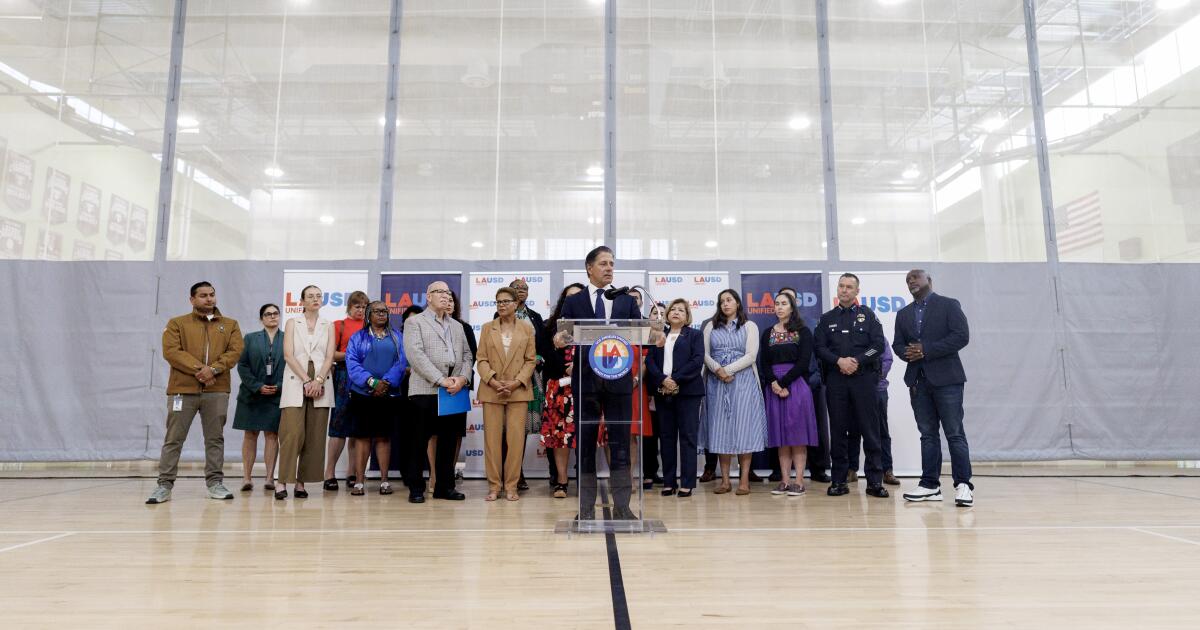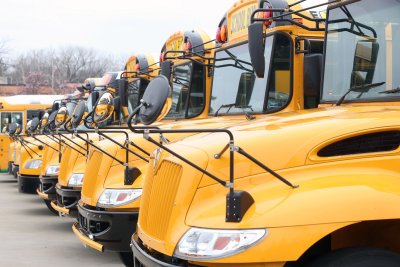LAUSD, Bass, pledge back-to-school protections for immigrant families
Los Angeles Unified school police, staff and community volunteers will form protective perimeters around at least 100 schools when classes begin Thursday to help ensure the safe passage of children — an announcement that came on a day that immigration agents reportedly handcuffed, detained and drew their guns on a student outside Arleta High School in a case of mistaken identity, officials said.
The 15-year-old boy, a student with disabilities, was visiting Arleta High School with family members when federal agents detained him, L.A. Unified officials said. Family members intervened and, after a few tense moments, the agents released the boy. The school’s principal also came out to assess the situation. Agents left behind some bullets on the sidewalk, apparently by mistake, which were collected by school police.
“Such actions — violently detaining a child just outside a public school — are absolutely reprehensible and should have no place in our country,” school board member Kelly Gonez, who represents Arleta High, said in a social media post.
A spokesperson from the Department of Homeland Security could not immediately be reached for comment.
Across Los Angeles Unified, parents, teachers and staff have expressed deep fears about school safety amid immigration raids. Citywide, leaders are concerned that children whose parents are living in the country without legal status will be kept home as families grapple with the climate of fear.
L.A. schools Supt. Alberto Carvalho spoke Monday at a news conference near district headquarters, saying the district is doubling down on efforts to protect students and families by creating and expanding “safe zones” around campuses, before and after school, with the help of community workers, school police and local police departments.
Bass was not specific about what role the Los Angeles Police Department would play.
“The school police and the Los Angeles Police Department have a strong working relationship and will continue to share information as appropriate as needed,” Bass said. “But neither police departments assist with immigration enforcement and have not for many, many years. There will be adults in the community who will serve as eyes and ears on the street.”
At least two mayors from smaller cities pledged direct police assistance in patrolling areas around schools.
Although local police are not legally allowed to stop or interfere with federal law enforcement actions, authorities will alert parents along walking routes if agents are in the area. Also, they will trigger a communication chain to alert all nearby campuses of raids so that schools can take lockdown actions as necessary.
The public commitment was intended to reassure families that school will be a safe place and that officials also will do what they can to protect families on their way to and from campuses.
In a string of recent appearances, Carvalho has reviewed a list of measures taken by the nation’s second-largest school system.
These included home visits and calls in recent weeks to more than 10,000 families considered at risk of immigration enforcement or at risk of not coming to schools. The school system also is distributing family preparedness packets, “all the information in one single form, in a multitude of languages,” said Carvalho, with the goal of “explaining the rights of our children and their parents, but also providing easy access to the resources that we have available to all of them.”
The district also has created a “compassion fund” to provide general help for families, including legal assistance.
In addition to students from immigrant families, the school system also has more than 350 employees who are working legally but who could have their legal status revoked.
“They continue to be the valiant, productive workers they are with us,” Carvalho said last week.
The district is working to reroute buses to make transportation more accessible to families. For the most part, the busing system is used by students with disabilities — for whom transportation is legally required — and students attending magnet programs at campuses far from where they live.
But this could change when the parameter for riding a bus is safety. In this light, neighborhood proximity to bus stops matters a lot, because families can be exposed to immigration enforcement while traveling to and from a stop.
The buses themselves will be a considered an extension of the campus environment and federal agents will not be permitted to board them.
The Monday news conference took place at Roybal Learning Center, just west of downtown, which also is the headquarters of the L.A. Unified School Police Department, which is expected to have a role in monitoring immigration enforcement and potentially confronting it.
Others in attendance included members of the L.A. Board of Education as well as South Gate Mayor Maria Davila. West Hollywood Mayor Chelsea Lee Byers and Bell Mayor Mayor Ali Saleh.
Los Angeles Unified covers an area totaling 710 square miles, which includes most of the city of Los Angeles, along with all or portions of 25 cities and some unincorporated areas of Los Angeles County. About 4.8 million people live within school-district boundaries.


